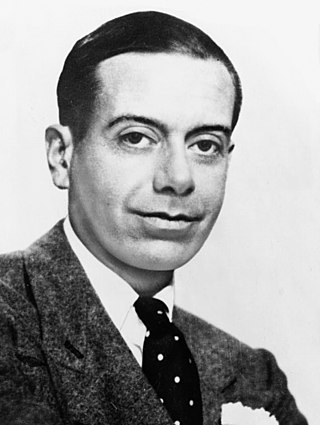Related Research Articles

Cole Albert Porter was an American composer and songwriter. Many of his songs became standards noted for their witty, urbane lyrics, and many of his scores found success on Broadway and in Hollywood films.

Fifty Million Frenchmen is a musical comedy with a book by Herbert Fields and music and lyrics by Cole Porter. It opened on Broadway in 1929 and was adapted for a film two years later. The title is a reference to the hit 1927 song "Fifty Million Frenchmen Can't Be Wrong" by Willie Raskin, Billy Rose, and Fred Fisher, which compared free attitudes in 1920s Paris with censorship and prohibition in the United States. The musical's plot is consistent with the standard boy-meets-girl plots of musical comedies of the first half of the twentieth century.

Gay Divorce is a musical with music and lyrics by Cole Porter and book by Dwight Taylor, adapted by Kenneth Webb and Samuel Hoffenstein. It was Fred Astaire's last Broadway show and featured the hit song "Night and Day" in which Astaire danced with co-star Claire Luce.

Broadway Melody of 1940 is a 1940 MGM film musical starring Fred Astaire, Eleanor Powell and George Murphy. It was directed by Norman Taurog and features music by Cole Porter, including "Begin the Beguine".
"All of You" is a popular song written by Cole Porter and published in 1954.

"Night and Day" is a popular song by Cole Porter that was written for the 1932 musical Gay Divorce. It is perhaps Porter's most popular contribution to the Great American Songbook and has been recorded by dozens of musicians. NPR says "within three months of the show's opening, more than 30 artists had recorded the song."

Ella Fitzgerald Sings the Cole Porter Song Book is a 1956 studio double album by American jazz singer Ella Fitzgerald, accompanied by a studio orchestra conducted and arranged by Buddy Bregman, focusing on the songs of Cole Porter.
"Don't Fence Me In" is a popular American song written in 1934, with music by Cole Porter and lyrics by Robert Fletcher and Cole Porter. Members of the Western Writers of America chose it as one of the Top 100 Western songs of all time.

Night and Day is a 1946 American biographical and musical film starring Cary Grant, in a fictionalized account of the life of American composer and songwriter Cole Porter.
"Just One of Those Things" is a popular song written by Cole Porter for the 1935 musical Jubilee.

Galore is a compilation album released by Kirsty MacColl in 1995. It features material previously released on the studio albums Desperate Character (1981), Kite (1989), Electric Landlady (1991) and Titanic Days (1993), among other tracks by MacColl, totalling eighteen songs. Some of the tracks differ from their original releases; a couple of songs, such as "Innocence", are alternate takes, while "Miss Otis Regrets" is a different edit that omits the second half, "Just One of Those Things", performed by the Pogues. On release the album peaked at No. 6, MacColl's highest ever charting album.

Titanic Days is the fourth studio album by Kirsty MacColl, released in 1993. Containing eleven tracks, Titanic Days was sometimes hard to get in years after its release, but it was remastered and re-released in 2005 by ZTT with a second CD of non-album tracks and some live recordings, including a version of "Miss Otis Regrets". In 2012, another remastered re-issue of the album was released by Salvo/ZTT, which again featured a second disc of bonus tracks. This is the final album to be produced by her husband Steve Lillywhite, before they divorced several years after the release.
"I Love You" is a song written by Cole Porter in 1944 for his stage musical Mexican Hayride.
"Anything Goes" is a song written by Cole Porter for his 1934 musical of the same name. Many of the lyrics include humorous references to figures of scandal and gossip from Depression-era high society.

We All Love Ella: Celebrating the First Lady of Song is a 2007 tribute album to Ella Fitzgerald produced by Phil Ramone for Verve Records, released to mark the 90th anniversary of her birth. The "all-star" list of featured vocalists is backed for most part by an orchestra led by Rob Mounsey. The album contains the first release of a duet of Ella Fitzgerald and Stevie Wonder, who joined her on stage with her small band at the New Orleans Jazz and Heritage Festival in 1977.

"So Near and Yet So Far" is a song written by Cole Porter, for the 1941 film You'll Never Get Rich, where it was introduced by Fred Astaire, and accompanied a dance with Astaire and Rita Hayworth, choreographed by Robert Alton. Astaire and Hayworth's performance was significant as the only occasion where Astaire's female dancing partner led the choreography of the dance. Porter's biographer, William McBrien described the song as "beautiful and highly successful".
"(You'd Be So) Easy to Love" is a popular song written by Cole Porter for William Gaxton to sing in the 1934 Broadway show Anything Goes. However Gaxton was unhappy about its wide vocal range and it was cut from the musical. Porter re-wrote it for the 1936 film Born to Dance, where it was introduced by Eleanor Powell, James Stewart, and Frances Langford under its alternate title, "Easy to Love". The song was later added to the 1987 and 2011 revivals of Anything Goes under the complete title "You’d Be So Easy to Love".
"C'est Magnifique" is a 1953 popular song written by Cole Porter for his 1953 musical Can-Can, where it was introduced by Lilo and Peter Cookson. The song became a standard. The only version to chart was by Gordon MacRae which reached No. 29 for one week.

Kirsty Anna MacColl was an English singer-songwriter, daughter of folk singer Ewan MacColl. She recorded several pop hits in the 1980s and 1990s, including "There's a Guy Works Down the Chip Shop Swears He's Elvis" and cover versions of Billy Bragg's "A New England" and the Kinks' "Days". Her first single, "They Don't Know", had chart success a few years later when covered by Tracey Ullman. MacColl also sang on a number of recordings produced by her husband Steve Lillywhite, most notably "Fairytale of New York" by the Pogues. Her death in 2000 led to the "Justice for Kirsty" campaign.

At the Great American Music Hall is a 1976 live album by Carmen McRae, recorded at the Great American Music Hall in San Francisco. McRae is joined on several tracks by the trumpeter Dizzy Gillespie, and backed by her jazz trio of pianist Marshall Otwell, bassist Ed Bennett, and drummer Joey Baron. McRae was nominated for the Grammy Award for Best Jazz Vocal Album at the 19th Annual Grammy Awards for her performance on this album.
References
- 1 2 3 4 Sarah Kate Whitfield, ed. (2019). Reframing the Musical: Race, Culture and Identity. Macmillan. pp. 65–67. ISBN 9781352004403.
- ↑ Hi Diddle Diddle, secondhandsongs.com; accessed May 30, 2016.
- 1 2 3 Schwartz, Charles (1979). Cole Porter: A Biography Da Capo Press, ISBN 9780306800979
- ↑ "Jimmie Daniels - Music In My Heart / Miss Otis Regrets (She's Unable To Lunch Today)". Discogs. 1934. Retrieved 8 August 2023.
- ↑ "Record Research 181/182". Archive.org. April 1981. Retrieved 8 August 2023.
- ↑ Whitburn, Joel (1986). Joel Whitburn's Pop Memories 1890-1954. Menomonee Falls, Wisconsin: Record Research Inc. p. 440. ISBN 0-89820-083-0.
- ↑ Vladimir Bogdanov; Chris Woodstra; Stephen Thomas Erlewine, eds. (2001). All Music Guide: The Definitive Guide to Popular Music. Hal Leonard. pp. 814–815. ISBN 9780879306274.
- ↑ Miss Otis Regrets on YouTube